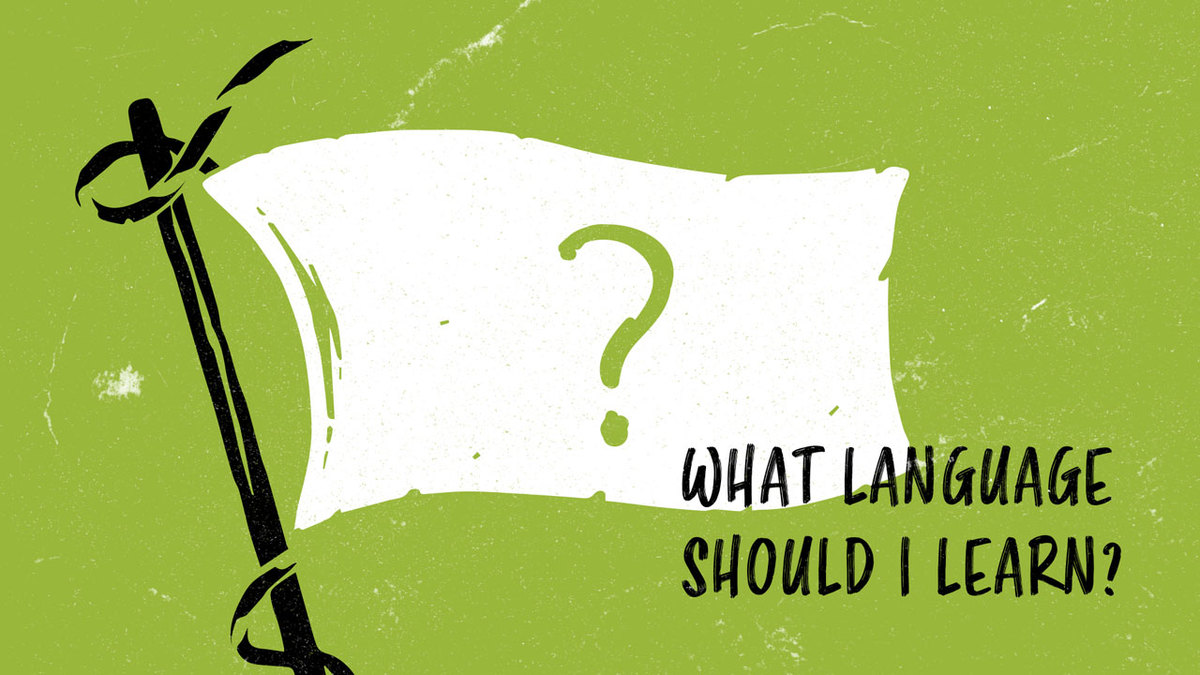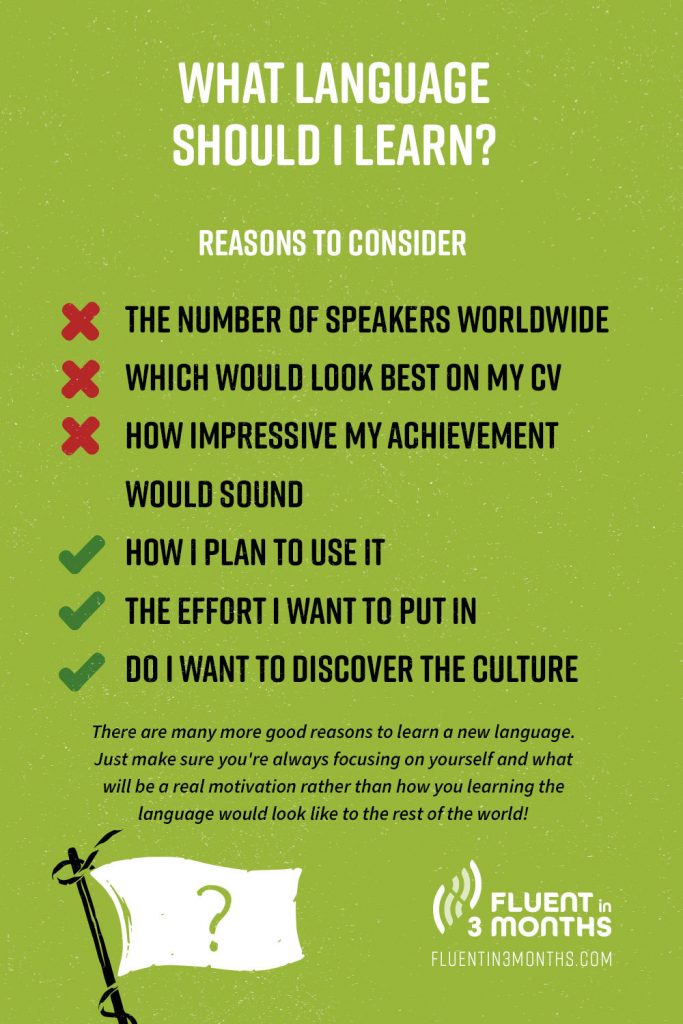What Language Should I Learn? The Bulletproof Guide
“What language should I learn?”
When I first started this blog, I presumed most readers would have pretty solid decisions of what languages they were learning, but the several emails I get everyday seem to say otherwise!
So many people are asking me what I think they should learn. After debating with myself briefly about whether I should abuse this power and create my own army of Na’vi speakers just for the hell of it, I decided to be helpful instead 😉
Table of contents
There are so many criteria for picking a language. Once again, I’m going to have to say that so many of them that people typically look at are wrong, similar to the criteria for what makes a language hard.
I’m not going to tell you which language to choose, but I am going to suggest ways to avoid making the wrong decision.
“Should I Learn the Language With the Most Number of Speakers?”
Any language pissing competition almost always includes the statistic of the most number of speakers of any given language.
| Most spoken languages in the world | |
|---|---|
| Chinese | 1.1 billion speakers |
| English | 983 million speakers |
| Hindustani | 544 million speakers |
| Spanish | 527 million speakers |
| Arabic | 422 million speakers |
| Malay | 281 million speakers |
| Russian | 267 million speakers |
| Bengali | 261 million speakers |
| Portuguese | 229 million speakers |
| French | 229 million speakers |
This is a bad way to decide which one to go for.
Two of the major “languages” in the list for example, Chinese and Arabic, aren’t even languages for practical purposes. The dialects are so vast that even native speakers have a difficult time understanding one another when speaking, or are sometimes completely unintelligible.
Even a language like Portuguese has to be somewhat relearned if you move from Brazil to Portugal.
But forgetting that for a second – let’s imagine you did go for a language because it has half a billion speakers. How does this actually help you? Do you plan to visit all the villagers speaking that language?
Looking at “most speakers” in terms of making a decision sometimes comes down to nothing more than ego. You get more “points” for the bigger number.
Even if you go live in the country, you’ll be unlikely to visit more than a handful of towns and come across the same number of speakers as you would in any other country. Then when not in the country, it depends on how much that culture travels.
For example, I’ve met way more Israelis than I have Chinese/Russians etc. when travelling in Brazil (of all places).
In most cases you will speak with such an infinitesimally small percentage of the total population of speakers that basically any language will give you more than a lifetime’s worth of conversations and new people you can meet.
I’m not trying to discourage people from going for the big languages – but just make sure you are picking them for the right reasons.
Even a language like Irish has enough speakers to keep you busy if you really dive into it.
“Should I Go For the Language That Will Look Best On My CV/Resume?”
Picking the most “spoken” languages isn’t even that great a career choice, because so many other people do that too. You aren’t necessarily distinguishing yourself from the noise.
I worked as a translator for several years. From seeing how the industry works, I can tell you that the best paid and most in-demand translators are those with less common language combinations.
The “most spoken” language also depends entirely on where you are.
If you are in Europe, then knowing German will help secure you a job much quicker than others in the tourist industry (apart from English). in many parts of the United States, that would be overshadowed by Spanish in terms of immediate practicality.
In most jobs that don’t require you to actually speak other languages, having any of them on your CV is impressive to employers. (Or it depends on the employer’s personality.)
Having simply learned a foreign language seems to have become a badge of honour in some places. In this case the actual language itself makes little difference.
What Really Matters: How You Plan to Use the Language
Number of speakers or misleading career advantages are empty reasons for picking a language. You have to ask yourself why you really want to learn a language.
Do you want to be able to read literature in that language? Attend Italian Operas? Embrace your German heritage?
Are you sure you really want to speak a language?
This is a social undertaking, not an academic one. Spending all your time with books or courses may help a little, but unless you are willing to make mistakes in front of people, you won’t get far on improving your spoken abilities. ✓
If you want to just “know” a language, then reading and listening a lot might be all you actually need. Many people enjoy this academic side of it. That’s great, but it’s better to be clear about your goals from the onset!
If the idea of speaking “a” foreign language is all that tickles your fancy, you have to realise how much time needs to be invested in the project. Try Esperanto first to see how it feels.
Learning a language for no work is a pipe dream – going into it half-assed won’t give you anything tangible – you can spend years on a language and get nowhere, or you can spend just a few months on it and speak it well if you are passionate about it.
My Preference to Choose a Language: Cultural Reasons
There are dozens of good reasons to pick any particular language. My own depends almost entirely on the culture of the people who speak it.
I get emails every day suggesting that I should take on language-X because my current list of European languages (although I’ve since expanded it to include other languages like Chinese) isn’t impressive enough.
Impressing people is a pathetic reason to choose to devote months of your time to something.
People think that being a polyglot may perhaps give you instant rockstar status. I can tell you that, while it piques people’s curiosity at first, after 20 seconds you have to rely on your own personality if you want to make new friends, no matter what your achievements are.
In those situations, one particular language is always more than enough. I learn languages because I intend to use them, not so I can wear them as a badge.
I can tell you right now that my own decisions to learn languages have little to do with impressing linguists. If I decide to learn yet another Romance language (Romanian is the only one I haven’t touched at all) because I want to, then I will. Protests from people calling me lazy are irrelevant.
Then, on the other hand, Chinese, Japanese etc. don’t “scare” me one bit in terms of being harder. My choices thus far have been because I know I’d enjoy myself living in that culture.
European and South American culture has a lot to discover, but I’m always up for something new and you can bet I’ll be diversifying my language families a lot.
What Languages Will I, Benny, Learn Next?
Don’t take the title of this post as an invitation, I’m not really asking.
I will never be taking surveys or votes for which language I should learn next. This is not a democracy: I am the dictator, king and overlord of next-language-choices and all decisions are final 😉
Most people who email me to tell me to start this or that language next give completely irrelevant reasons to me.
- How complex the grammar would be, as a nice challenge. Yawn, that’s not a language, that’s as good as a sales pitch for a mathematical theorem.
- How impressive it would be. If I want weak validation from people, I’ll learn how to juggle fire-breathing monkeys.
- Or that they really, really want me to. Nicer, but still not quite convincing!
My choice is always based on the culture of the people who speak the language itself and my interest in getting to know that country.
How much fun would I have going out and socialising with them? What is day-to-day life like in that country? How easy is it to make new friends in that country? Or is it worth the challenge of attempting to break down people’s stereotypes of that?
I know a lot of people reading this blog are linguists, but I’m a traveller. Speaking languages is just a natural consequence of wanting to get truly immersed in cultures and expand my horizons.
Languages are just a means to an end for me. They are not the end. PEOPLE are the channel that languages come out of. If you don’t use the language to communicate with human beings, then it’s just a faceless list of grammar rules and vocabulary tables.






Social